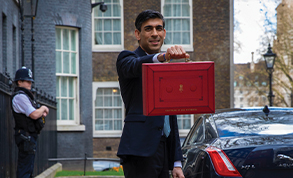Treasury boosts coronavirus response fund
The announcement almost triples the initial £5bn fund announced in the March Budget. The Treasury said that the £14.5bn funding package included £6.6bn of support to health services, helping to free up hospital beds and helping to acquire ventilators, diagnostic tests and protective equipment for NHS staff. Treasury funding has also been used to enable the home delivery of medicines to the most vulnerable and to support medical and nursing students and retired clinicians to join the front line.
Alongside £1.6bn of new funding for local authorities, the Treasury said the health service funding meant it had provided £2.9bn to support local services and hospital discharge, reinforcing care for the vulnerable and enabling faster discharge for those strong enough to leave hospital.
Scotland, Wales and Northern Ireland will share in almost £2bn of allocations as indicated by the Barnett formula.
Chancellor, Rishi Sunak (pictured), said the country depended on its public service workers. ‘That is why we are doing everything we can to provide our NHS, local authorities and others, with the resources and tools they need to tackle the virus.
'From the start, I’ve been clear our vital public services will get whatever they need to protect this country and its people from Coronavirus,’ he added. ‘We are delivering on our pledge.’
On top of the £8.2bn for health and local authorities and £1.9bn for the devolved administrations, £4.4bn is supporting continued rail services and food packages for extremely clinically vulnerable people shielding at home.
Niall Dickson, chief executive of the NHS Confederation, said the extra funding was welcome and necessary. ‘The immediate issue is making sure the heath service and social care will not fall over in the next few weeks. Everyone involved is bracing themselves for what could be a massive wave of cases – we must hope we have done enough to prevent these services from being overwhelmed, but we will not know for some time.’
He added that once the pandemic was over, the NHS will have to work through thousands of patients who should have been treated earlier.
Related content
We are excited to bring you a fun packed Eastern Branch Conference in 2025 over three days.
This event is for those that will benefit from an overview of costing in the NHS or those new to costing and will cover why we cost and the processes.